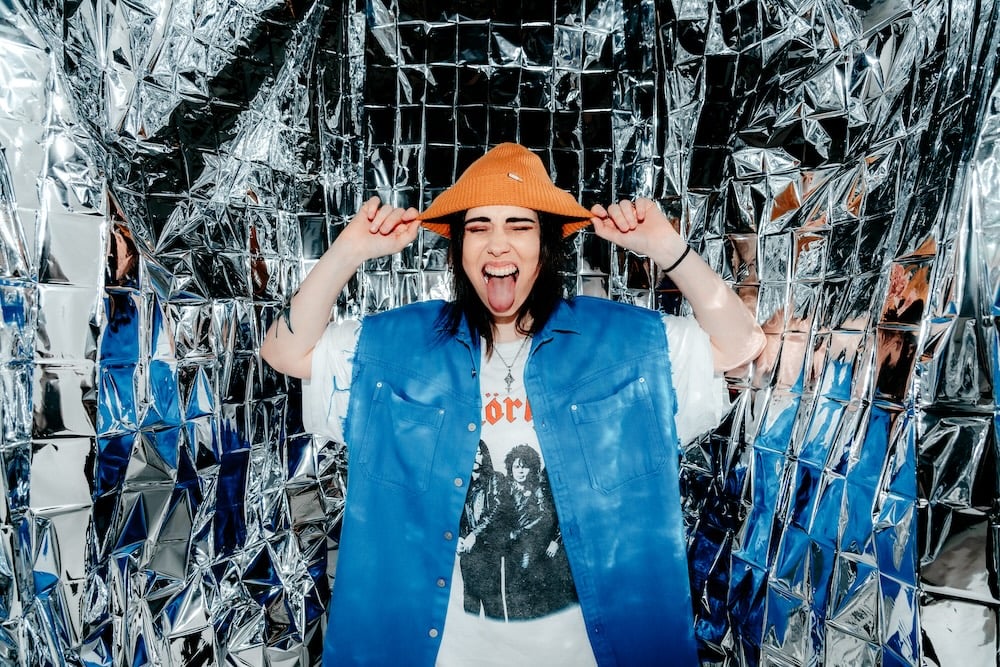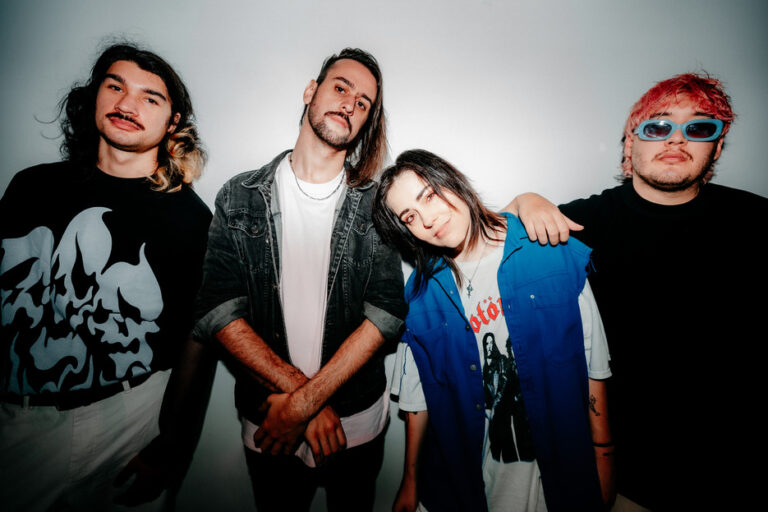Supplied
Bonnie Fraser’s Great Purge: The Exorcisms and Truths Behind Stand Atlantic’s New Record
How Bonnie Fraser’s struggle with trauma, self-doubt, and newfound empowerment shaped one of pop-punk’s most gripping records
Bonnie Fraser is sitting at a picnic table in a park near her childhood home. Following an agonising wait and a drip-feed of searing singles, Stand Atlantic’s fourth record was unleashed to fans just 12 hours ago.
One would think that the smiling frontwoman — rugged up in an oversized Cypress Hill hockey jersey, a black puffer jacket and long baggy shorts — would be bathing in post-release bliss and Sydney sunshine. And while she’s flashing the diamanté gems on her teeth with genuine pride, she’s also thinking about dying.
“I think about death every day.”
Every day?
“Every day. Do you not?”
No. What?
“You don’t think about death every day?”
Love Music?
Get your daily dose of everything happening in Australian/New Zealand music and globally.
No, no, I, I genuinely… maybe I should?
“No, don’t. I wouldn’t recommend it.”
Up until Bonnie was four, an only child to her now divorced parents, her mother and father thought she was mute. A quiet kid with extroverted parents, she grew up aching for siblings, wishing she was less the ‘apple of their eye’ and more an independent wallflower. When she was 12, she started her first band with a few of the neighbourhood kids and she learned to channel her emotions into poems. Those poems then became songs, which then became albums.
In 2022, Stand Atlantic’s third studio album, f.e.a.r. (Fuck Everything and Run), debuted at No. 10 on the ARIA Album Chart. Fueled by anthemic singles like “hair out” and the hard-hitting “deathwish” (which clocks over one million streams a month)., F.E.A.R. swiftly amassed over 80 million streams.

Now, four albums deep with Stand Atlantic, Bonnie, lead guitarist David Potter, bassist Miki Rich, and drummer Jonno Panichi are reaping what they’ve sown. Since signing to Hopeless Records in 2018, Stand Atlantic has toured with acts like Waterparks, Pierce The Veil, and I Prevail, sold-out shows across Europe and the tough-to-crack U.S. market, and on the just-released WAS HERE album, collaborated with PVRIS, Platinum hit-maker Sueco and Mexican alt-pop star Bruses.
Stand Atlantic’s global appeal is undeniable. The band has racked up 300 million streams, graced the covers of Rock Sound and KERRANG!, and dominated international stages from Reading & Leeds in the UK to the Sad Summer Festival in the U.S. Their recent co-headline tour in the U.S. sold 40,000 tickets, while their nearly sold-out UK and European shows further cement their status as one of pop punk’s most dynamic forces beyond Australian shores.
Pummelling drums, pop sensibilities woven into punk and hardcore rage, and the kind of guttural screams that make you want to enter the pit, WAS HERE exudes boundary-shattering angst.

It isn’t just another battle-scarred record in the Stand Atlantic canon either, it’s Bonnie Fraser at her most autobiographical. With tracks like “17”, “Freakin’ Out” and “Nose Bleed”, WAS HERE is the product of a songwriter facing her demons in real time.
“With this record, I knew that in order to get anywhere close to that [honesty], I’d have to dig deeper and really, really face everything that I was going through,” Bonnie admits. “And I wanted to be more direct in the way I wrote, and challenge myself in that sense as well.”
Challenging herself meant going against a few life-learned habits, like people pleasing. Tracks like “Love U Anyway”, “Wake Up”, “Criminal” and “Freaking Out” did not come easy. Following the break-up of an almost five-year relationship with another musician, Bonnie was surrounded by worry and a need to protect her ex-partner from any scrutiny, public or otherwise.
“I was just not in a good relationship at all. It wasn’t good for me,” she says, cradling her knees close to her chest. “The toxic environment of it, and nature of it just caused me to shut down. I felt like I couldn’t speak to my friends about it without them judging that person, or whatever.
“[…] The constantly trying to protect her fucked me up. Then I just felt so isolated because I couldn’t talk about anything — or I thought I couldn’t talk about it. And then, it started seeping into every aspect of my life.”
It took introspection, therapy, and one pointed conversation with her longtime co-writer and producer Stevie Knight to bring Bonnie back to a place of empowerment. She stopped numbing herself with drugs and alcohol, and decided to face the darkness head on.
“I realised that making music and being in this band, and writing, is the most important thing to me,” she says. “I need it. And for me to be scared to do it — because I wasn’t sure if I could do it — was frightening and I was like, ‘Okay, time to fucking sack up and face this stuff’, and not be scared to say the shit I need to say or do the things I need to do to put myself first; for the first time ever.”
Content Warning: This part of the article contains a personal account of sexual assault which may be triggering to survivors.
The most obviously autobiographical track on the album is the hardest to digest for fans, and even harder to talk about for Bonnie.
Have you ever answered the question, what is “17” about? And do you feel comfortable answering that question?
“No, I’ve never actually been directly asked, which is crazy,” she says, before a short pause. “I feel like it’s kind of self explanatory or like very, I think it’s quite direct.”
Bonnie pauses again. A little longer this time.
“But yeah, my mum asked me today actually because I’d never talked to her about it and she was like, ‘Are you okay to speak about it? Do you want to speak about it? She was super sweet and I was like, ‘Not right now’.”
Bonnie takes another pause, a little longer than the last.
“Yeah, I just had a person in my life who, just very, very much took advantage of me… in a sexual way. And I mean, let’s call a spade a spade; it was sexual assault. That’s what it is, and it’s sad and it happens more than it should ever, because it should never happen.”
Beatles great Paul McCartney has spoken of music as therapy. In his 2016 interview with Rolling Stone, he said: “Music is like a psychiatrist. You can tell your guitar things that you can’t tell people. And it will answer you with things people can’t tell you.”
“17” and the follow-up track “17 // reprize [one take]” are what happens when you let music be the conduit for your connection to self. Stand Atlantic were on the Sad Summer tour in ?? and she woke up from a nightmare involving her abuser. She was punching the bunk above her, covered in sweat and seething with rage.
“I’m not a violent person,” Bonnie says, “so I don’t know what the fuck that was, and it really made me sit down with myself and assess that.
“I think what sparked it was that it coincided with what was happening in my personal life and my relationship. I was just not in a good spot at all and hiding so much stuff from myself and others that it all just came out at once and like, triggered each other.”
The real-time feedback from victim-survivor fans on the ways in which “17” soundtracked their own healing journeys eclipsed Bonnie’s concerns about releasing the song.
“If [the song] can help someone else in that position, or situation and they can relate to it, I think that is more important to me than my own feelings or attachment to it and like, my own personal fears about it.”
As Stand Atlantic readies another European tour for next month, Bonnie is itching to get back on the road, but not for all the reasons you might think. Her biggest motivation is time spent with her band of brothers; the siblings she wished for but never had.
“They are all just so important to me for different reasons,” she smiles. “Like Jonno, I can trust him with my complete life. If I’m fucked out of my brain or my drink got spiked, he would be the first person to notice and take care of me.
“Miki is the lovable favourite boyfriend that I’ve ever not had. He’s so soft emotionally I think, and if you need to take your mind off something, he is the guy to go to.
“And Potter loves to tell me when I’m wrong,” she laughs. “You need that. He’s the moral and ethical compass. He doesn’t come across like that ‘cause he’s so loud a lot of the time […]. But he is very, very ethical. I think without him, we would have made some silly decisions without thinking things through.”

If Bonnie Fraser’s past fixations were her demons, consider this her year of exorcisms. Granted, thoughts of death and the many ways it might claim her still cross her mind daily — “I could have a heart attack and die at any moment, or a car could hit me at any point” — but one obsession she has left behind is concealing her sexuality.
“I think I was insecure about the thought of making that my whole identity without meaning to or something — when that’s just so ridiculous. That is a big part of me obviously, but like, who the fuck cares? Now I’m like, if that’s all you care about, that’s sweet with me. I don’t care anymore. I do not care.”
Bonnie Fraser is as beautifully complex as all of your favourite punk revivalist frontwomen. There are glimpses of unadulterated contentment but peppered throughout are all the ingredients to make WAS HERE an enduring pop punk record: fury, insecurity, bravado and carnal simplicity.
As she considers her now decade-long career, the line she teeters between satisfaction and dread has never been more present:
“I have never felt more gratitude than I have recently. […] I don’t know whether that’s just because I’ve been through the fucking dirt in the last couple of years, but I genuinely am just so grateful,” she says, before swiftly adding, “and I’m scared it’s all just going to crumble at any second. So I just want to make sure I’m appreciating it every day.”
Stand Atlantic’s WAS HERE is out now.
If you have experienced sexual assault or sexual harassment and feel you would like to speak to someone for support or information, 1800RESPECT (Phone: 1800 737 732) can provide counselling 24-hours a day, 7 days a week.
Australian music industry workers can contact the Support Act Wellbeing Helpline. It is staffed by professional counsellors who offer expertise in all areas related to mental health. It is free, confidential and open to anyone in music or the arts. Call 1800 959 500, 24/7, 365 days a year.
Stand Atlantic 2024 Australian Tour
With Sly Withers & Vana
Ticket information available via standatlantic.com
August 28th
The Forum, Melbourne, VIC
August 30th
UNSW Roundhouse, Sydney, NSW
August 31st
Fortitude Music Hall, Brisbane, QLD



































